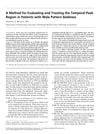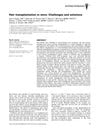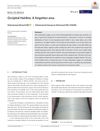 4 citations,
March 2022 in “Frontiers in pharmacology”
4 citations,
March 2022 in “Frontiers in pharmacology” Prunus mira Koehne is valuable for hair growth and has potential for sustainable use, but needs more research and conservation.
 4 citations,
August 2020 in “Journal of Cosmetic Dermatology”
4 citations,
August 2020 in “Journal of Cosmetic Dermatology” QR 678 and QR678 Neo treatments are effective for hair loss in women with PCOS.
 4 citations,
April 2020 in “Facial Plastic Surgery Clinics of North America”
4 citations,
April 2020 in “Facial Plastic Surgery Clinics of North America” Hair loss in women is complex to diagnose and treat, and hair restoration should be done by experts. Using minoxidil before surgery can help manage post-surgery hair shock loss. The Follicular Unit Transplantation method is recommended for women due to its speed, no need for shaving, and better graft quality. Strategies like L, T, and reverse L patterns can help restore central hair density, and regenerative methods can improve graft survival in hair transplants.
 4 citations,
September 2019 in “Journal of Cosmetic Dermatology”
4 citations,
September 2019 in “Journal of Cosmetic Dermatology” FUE megasession effectively treats severe hair loss with natural-looking results in one operation.
 4 citations,
May 2013 in “Actas Dermo-Sifiliográficas”
4 citations,
May 2013 in “Actas Dermo-Sifiliográficas” Most Spanish Caucasian women have a widow's peak, and their hormone levels suggest they process certain hormones faster.
 4 citations,
January 2005 in “Elsevier eBooks”
4 citations,
January 2005 in “Elsevier eBooks” Follicular Unit Transplantation is a precise hair restoration technique that requires careful planning and a skilled team, and Follicular Unit Extraction offers a less invasive option.
 4 citations,
May 2004 in “Facial Plastic Surgery Clinics of North America”
4 citations,
May 2004 in “Facial Plastic Surgery Clinics of North America” Hair transplantation helps women with hair loss; understanding and empathy lead to happy patients.
 4 citations,
May 2002 in “Dermatologic Surgery”
4 citations,
May 2002 in “Dermatologic Surgery” The method improves natural appearance in hair restoration by properly evaluating and treating the temporal peak region.
 3 citations,
January 2023 in “PloS one”
3 citations,
January 2023 in “PloS one” Implanting hair-follicle stem cells in mice brains helped repair brain bleeding and reduced brain inflammation.
 3 citations,
January 2023 in “Physiological Research”
3 citations,
January 2023 in “Physiological Research” Conditioned media from mesenchymal stem cells show promise for tissue repair and disease treatment, but more research is needed on their safety and effectiveness.
 3 citations,
July 2021 in “Aesthetic Plastic Surgery”
3 citations,
July 2021 in “Aesthetic Plastic Surgery” PHAT may improve hair growth better than PRP alone.
 3 citations,
February 2021 in “bioRxiv (Cold Spring Harbor Laboratory)”
3 citations,
February 2021 in “bioRxiv (Cold Spring Harbor Laboratory)” Adult esophageal cells can start to become like skin cells, with a key pathway influencing this change.
 3 citations,
March 2019 in “Archives of Plastic Surgery”
3 citations,
March 2019 in “Archives of Plastic Surgery” Hair transplantation effectively corrects hairline issues after midface-lifting surgery with high patient and physician satisfaction.
 3 citations,
April 2016 in “Wound Repair and Regeneration”
3 citations,
April 2016 in “Wound Repair and Regeneration” Researchers successfully transplanted hair follicles in mice, which survived well and helped in wound healing.
 3 citations,
January 2016 in “BioMed research international”
3 citations,
January 2016 in “BioMed research international” Calcium microcapsules are better for long-term use in artificial dermal papilla, while barium microcapsules are good for short-term.
 3 citations,
January 2014 in “Plastic surgery (Oakville. Print)”
3 citations,
January 2014 in “Plastic surgery (Oakville. Print)” Hair transplant surgery is a safe and effective way to treat hair loss from scarring in Chinese patients.
 3 citations,
January 2014 in “Elsevier eBooks”
3 citations,
January 2014 in “Elsevier eBooks” Different stem cells have benefits and challenges for tissue repair, and more research is needed to find the best types for each use.
 3 citations,
May 2011 in “International Journal of Dermatology”
3 citations,
May 2011 in “International Journal of Dermatology” Using an epidural needle in hair restoration surgery can reduce grafts popping out, make the procedure easier, and result in natural-looking hairlines without obvious scarring.
 3 citations,
June 2004 in “Alternative and Complementary Therapies”
3 citations,
June 2004 in “Alternative and Complementary Therapies” The document concludes that hair loss is influenced by genetics and other factors, and while treatments like finasteride can help, they have limitations and side effects.
 3 citations,
June 1999 in “Seminars in Cutaneous Medicine and Surgery”
3 citations,
June 1999 in “Seminars in Cutaneous Medicine and Surgery” Hair transplantation can effectively treat female pattern hair loss with the right patient selection and surgical skill.
 3 citations,
March 1998 in “Aesthetic Surgery Journal”
3 citations,
March 1998 in “Aesthetic Surgery Journal” Experts suggest various surgical methods for hair restoration, including scalp reduction, transplantation using minigrafts, and establishing a permanent frontal hairline with follicular units. The drug finasteride may also be used alongside these procedures.
 3 citations,
July 1997 in “Current problems in dermatology”
3 citations,
July 1997 in “Current problems in dermatology” Hair restoration surgery has evolved over time, with a focus on natural-looking results and managing patient expectations, while also considering potential complications and the lifelong progression of male pattern baldness.
 3 citations,
February 1996 in “Dermatologic Surgery”
3 citations,
February 1996 in “Dermatologic Surgery” Walter P. Unger suggests using advanced hair transplant techniques for broader coverage, as they provide natural results and use donor tissue efficiently, while also recommending personalized planning due to the unpredictable progression of baldness.
 2 citations,
November 2018 in “Journal of Cosmetic Dermatology”
2 citations,
November 2018 in “Journal of Cosmetic Dermatology” The conclusion is that surgeons should carefully create a natural-looking occipital hairline in hair transplants to avoid detection.
 2 citations,
September 2018 in “Tissue Engineering Part A”
2 citations,
September 2018 in “Tissue Engineering Part A” Xeno-free three-dimensional stem cell masses are safe and effective for improving blood flow and tissue repair in limb ischemia.
 2 citations,
July 2018 in “Facial Plastic Surgery”
2 citations,
July 2018 in “Facial Plastic Surgery” Hair restoration can enhance a facial plastic surgery practice with careful patient selection and detailed follow-up.
 2 citations,
March 2016 in “Obstetrics and Gynecology Clinics of North America”
2 citations,
March 2016 in “Obstetrics and Gynecology Clinics of North America” The document says that common skin conditions in adult women can be treated effectively, with acne being the most common and early-detected melanoma having a high survival rate.
 2 citations,
November 2015 in “Actas Dermo-Sifiliográficas”
2 citations,
November 2015 in “Actas Dermo-Sifiliográficas” Epidermal stem cells show promise for future dermatology treatments due to ongoing advancements.
 2 citations,
October 2015 in “Indian journal of science and technology”
2 citations,
October 2015 in “Indian journal of science and technology” SM-215 promotes hair growth by improving the environment around hair follicles.
 2 citations,
April 2015 in “S. Karger AG eBooks”
2 citations,
April 2015 in “S. Karger AG eBooks” The document concludes that successful surgical repair of scalp and forehead issues requires careful planning and various techniques depending on the injury or defect size.





























